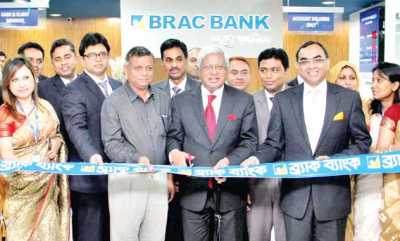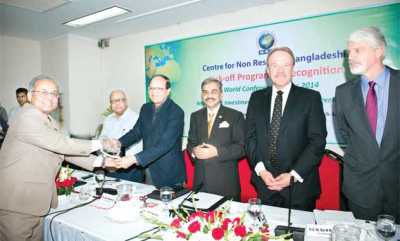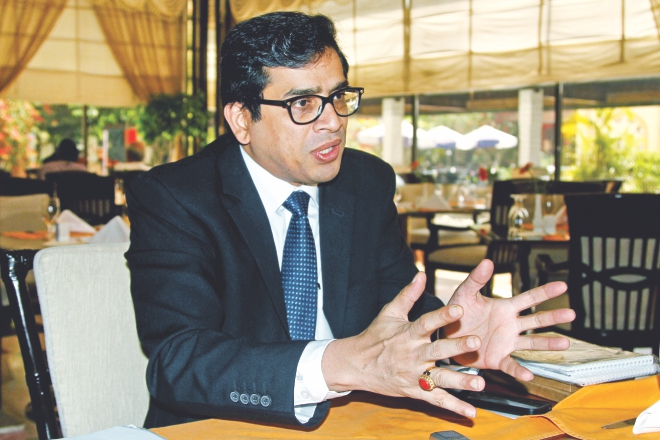BRAC Bank relocates Zindabazar branch

BRAC Bank relocated its Zindabazar branch to Symphony Heights on Barutkhana Road at East Zindabazar in Sylhet aiming at providing better service to its customers.
Ariful Haque Chowdhury, Mayor of Sylhet City Corporation, and Sir Fazle Hasan Abed, Chairman of BRAC Bank Limited, jointly inaugurated the branch recently, said a press release.
Syed Mahbubur Rahman, Managing Director and CEO, and senior officials of the bank attended the function.
Sir Fazle Hasan Abed said, “We must come forward with attitude of serving general people with customer-centric banking.”
“As a SME-focused bank, BRAC Bank usually opens branches to reach out to more people and cover more areas. We are committed for financial inclusion of the mass people,” he added.
Agrani Bank given award for bringing huge forex

Agrani Bank Limited received silver award for remarkable contribution in bringing higher remittance in the country.
The Centre for Non-Resident Bangladeshis (NRBs) organized the function titled “World Conference Series-2014” at a hotel in Dhaka on Tuesday, said a press release.
Shekil Chowdhury, Chairperson of the Centre for NRBs, presided over the function while US Ambassador Dan W. Mozena, EU Ambassador William Hanna and former governor of Bangladesh Bank Dr Farash Uddin Ahmed and FBCCI President Kazi Akram Uddin Ahmed were present at the function.
Mohammad Shams-ul-Islam, Deputy Managing Director of Agrani Bank Limited received the award from Dr Atiur Rahman, Governor Bangladesh bank.
Mobile banking key to financial inclusion
Senior official of Visa Inc talks about Bangladesh's potential

Uttam Nayak
Mobile banking is the perfect platform for Bangladesh to take financial services to the country's largelyunbanked population in an efficient and low-cost manner, an analyst said.
"Countries across the globe are moving to doorstep agent banking. It is the best way to go. This is the future," said Uttam Nayak, group country manager of Visa Inc for India and South Asia.
He said Bangladesh has 68,000 villages, but it cannot have bank branches in every village. "You can only do it through agent banking. Mobile banking is going to be significantly important for financial inclusion in the country," he told The Daily Star in an interview recently.
His comments came as a new study shows mobile banking in Bangladesh is gathering momentum after the number of subscribers soared more than threefold to 13.2 million last year.
There were more than 13.2 million registered users as of December 2013, transacting around Tk 6,600 crore per month through 182,000 agents, according to the study, Mobile Financial Services: Consumer Insights, by Pi Strategy Consulting and the World Bank.
Nayak was in Dhaka to meet his 20 partner banks. During his visit, Pubali Bank and Islami Bank Bangladesh, two top private sector banks, launched debit cards for their customers.
Visa has already had a product called mPOS (mobile point of sales) to cash in on the huge potential for mobile banking in Bangladesh.
"In developing countries like Bangladesh, Visa has a tremendous opportunity to deliver new payment products with mobile technology," Nayak said.
Through mPOS, Visa is working to enhance consumers' purchase experience by making mobile payments and services broadly available across many different handsets and operating systems.
Nayak said banks' terminals are expensive, and need telephone lines to connect. Bangladesh is not a completely connected market, but the country has made tremendous progress in mobile phones.
"By getting alternate delivery channels, the pressure on bank branches will go and it will also enable bank staff to go for consumer education and financial literacy rather than spending time only on counting cash and handling customers."
Nayak said Bangladesh should adopt electronic banking and card payments as they reduce cost for banks by up to 90 percent. "It allows banks to cut costs and reach more people."
He said Bangladeshi consumers spend Tk 10,000 crore a year in cash to make their everyday purchases. Only 1 percent of the amount happens electronically.
Consumers in India and Sri Lanka spend 3 percent of their total annual purchases electronically while the global average is 16 percent. Consumers in countries such as South Korea, Canada and New Zealand make 50 percent of their purchases electronically.
"The cash transfer of money is not productive. If there is more money lying in bank accounts, it means customers are earning more interest and banks have more money to lend."
"It is very important for any South Asian country as inefficiency is a worry in all countries. Cash also leads to corruption, leakage and pilferage. Moving to the electronic form makes it much more efficient."
The senior official of Visa Inc, which operates the world's largest retail electronic payments network and has been in Bangladesh since early 1990s, said banks would be able to do inclusive banking if they adopt electronic payments.
He said Bangladesh will go through a transformation in the next five years mainly due to an active role of the central bank.
The banks are going to introduce ecommerce which, Nayak said, would accelerate card payments significantly.
Without disclosing any specific numbers, he said the number of Visa card-holders is growing at double digits.
A market leader in Bangladesh, Visa cards are accepted by 20,000 merchants and 4,500 ATMs, with more than three million people carrying Visa card in a market of four million.
"It is a fast growing economy with young demographics. There is rapid penetration of mobile phones and the regulator is keen on cashless payments."
Nayak, who studied electronic engineering in India and the US, said checking fraud and money laundering is the beauty of electronic payments.
"You can monitor every transaction. Electronic payments help ensure transparency and prevent money laundering. It automatically happens in agent banking and electronic banking."
Nayak, who has been working with Visa for 18 years, said consumer education is important as most consumers use mobile money for only money transfers.
"You should be able to pay school fees and utility bills. Under the current system, you are giving money and receiving money. Thus you are reducing inefficiency, not eliminating it. The job of electronic payments is not to reduce inefficiency, but eliminate."
Electronic payments are not just convenient, they help stimulate growth for economies as well.
Electronic payments contributed to 0.8 percent increase in gross domestic product (GDP) in emerging markets and 0.3 percent in developed markets, according to a study by Moody's Analytics between 2008 and 2012 in 56 countries that make up 93 percent of the global GDP.
As of September 2013, the Visa's global network processed 87.5 billion transactions, $6.9 trillion total volume and $4.3 trillion payments volume.
On fraud control, Nayak said, “We score every transaction. We know in which country the fraud is happening and which merchants are doing fraud. We have the intelligence in the system to be able to decide whether it is a genuine transaction."
"Banks report all the fraudulent transactions to us. So, we are able to see a pattern of fraud coming in, and we are able to block the fraud."
Visa is trying to sign up all the banks and make them implement electronic payment technology.
"We are providing them with the best practices and case studies to show how the balances and profitability of the banks go up through alternative delivery channels. Branch transaction is the most expensive, while mobile transaction is the cheapest."
The 45-year-old said credit card is the most misunderstood product.
"For every product, there will be some people who will not understand how to handle credit and misuse it. In Bangladesh, banks have been extremely careful about giving credit cards to people who have repayment credibility. That is why the card penetration is very low in Bangladesh."
He said if credit cards are not handled properly by consumers it can create problem for banks.
"Some countries got carried away with credit cards. Ten years ago South Korea faced problems, as it gave too many credit cards and they had a crisis of non-payment. India also faced the same crisis stemming from
credit cards in 2009 when one out of four customers was not paying the bills as they were over-leveraged.
India had to slow down the business and close 10 million accounts and banks incurred huge losses."
Bangladesh has 700,000 credit card holders and about three million debit card holders. The sales volume stood at about $1 billion per year.
Pressure on BB as it reins in banks' stock exposure
Similar opposition was seen prior to 2011 market crash
In an echo of 2009, the central bank is again facing hostility for stepping up its measures against banks' excessive exposure to the capital market.
Bangladesh Bank on February 25 instructed banks to give a breakdown of daily investments in stocks in the monthly report submitted to the central bank on the 10th of every month.
At present, the banks just give their total investment figure to BB, which the central bank believes does not reflect the true picture.
BB found that many banks tend to invest heavily for the best part of the month and cut back toward the end to give BB the impression that their stockmarket exposure was not excessive.
The Banking Companies Act stipulates that banks cannot invest more than 25 percent of their total capital in stocks, and the central bank gave them until July 2016 to bring down their exposure.
As of December last year, banks and their subsidiaries' exposure stands above 50 percent of their capital on average. It stands at 150 percent for many.
However, the notice has not been well-received particularly by Bangladesh Securities and Exchange Commission that argued that it would create panic among the investors and destabilise the market.
Senior officials of BB and BSEC engaged in a heated argument during a regulatory meeting on Sunday, according to a source who was present.
After the meeting, BB Deputy Governor SK Sur Chowdhury told reporters that the central bank would bring some changes to the notice.
However, a BSEC commissioner told The Daily Star yesterday that they were not opposing the central bank's steps.
“We told the central bank that it can discuss with the BSEC before issuing notices on banks' exposure to the stockmarket and report submission on daily trading,” he said.
He explained that the stockmarket is a sensitive place, so any regulatory notice may create panic among retail investors at a time when the secondary market is trying to recover from the losses of 2011's market crash.
Amzad Hossain, a member of the BSEC, when contacted by The Daily Star, said the central bank assured the commission that it would revise the decision.
Ibrahim Khaled, who led the government probe into the stockmarket crash in 2011, said as per law it is the central bank's responsibility to monitor the exposure of the banks for the sake of depositors and retail investors.
“If the monitoring is relaxed as a result of bowing down to pressure, then it would create the situation we saw in 2009.”
The former deputy governor also said the BSEC's objection is “not logical”. “If the stock-market is run properly it will restore the confidence of the public in the market.”
Khaled also said after the introduction of demutualisation the indexes dropped for a few days but the market has again stabilised.
“It means that any well-intended measure always brings good results.”
When the Awami League grand alliance government came to power in 2009 the stockmarket was scaling new heights.
Seeing the huge gains to be made, banks invested aggressively in stocks by breaching rules.
It prompted Bangladesh Bank to take measures to rein in the bubble, but the central bank had to back off following pressure from influential quarters in the capital market.
The market eventually crashed. But what was most ironic was that those who had initially barred the central bank from taking steps aimed at controlling the bubble blamed it for not doing enough to prevent the crash.
BB and BSEC lock in heated debate
The central bank’s decisions on stock market related issues irks stock market regulator
The Bangladesh Bank’s policy decision related to capital market has sparked a heated debate among the stakeholders of the stock market at a coordination meeting at the central bank headquarters in Dhaka yesterday.
The debate started over the central bank’s latest instruction to the banks to limit exposure of their subsidiaries in the capital market, said an official who attended the meeting with Governor Atiur Rahman in the chair.
He said mainly the officials of Bangladesh Bank and Bangladesh Securities and Exchange Commission (BSEC) locked in the altercation in the closed-door meeting also attended by representatives from Insurance Development and Regulatory Authority (IDRA) and Microcredit Regulatory Authority (MRA).
According to a Bangladesh Bank circular issued on February 25, the total investment of a bank and its subsidiaries has been restricted to 50% of a sum of consolidated paid up capital, balance in share premium account, statutory reserve and retained earnings.
Earlier, there was no limit for the subsidiary companies of the banks.
The coordination meeting was told that the restriction has “created panic” among the retail investors in the stock market as they feared the central bank decision would “cause a free fall” of stock prices.
The market witnessed a fall of about 60 points in three consecutive sessions after issuing the circular as investors became skeptical about the possible impact of the order, an executive of a brokerage house said.
Besides, last month banks have been asked to submit their capital market investment portfolio everyday to Bangladesh Bank instead of every month.
Bangladesh Bank took the decisions without discussing with the stock market regulator BSEC, an official told the Dhaka Tribune yesterday.
In accordance with a finance ministry circular issued on February 19, 2012, the central bank needs to hold discussion with the BSEC before issuing any instruction related to capital market.
At yesterday’s coordination meeting, the BSEC chairman and commissioners raised the issue as to why the central bank had not informed them about the investment limit for banks, which is related to capital market.
At one stage, Bangladesh Bank, however, decided to review the decision of submitting investment portfolio everyday.
“In the context of BSEC demand, we took the decision to review the time frame of submitting investment portfolio by banks,” Deputy Governor SK Sur Chowdhury told reporters after the meeting. “We also agreed with BSEC that the capital market related decisions will be taken through co-ordination.”
BSEC Commissioner Amzad Hossain said the central bank assured them of coordination while taking decision on the stock market issues.
Earlier, the lack of co-ordination between the two authorities was marked in the share market inquiry report in 2011 as major cause for share market disaster in late 2010.
There was astronomical rise in the share market in 2009-2010 period due to over investment by banks. Maximum bank had invested above 10% of their liabilities.
Bangladesh Bank asked the banks to cut down their investment from capital market and tighten their supervision. The central bank took the decision without discussing with the capital market regulator. As a result, the market fell into debacle.
Under the circumstances, the finance ministry issued the circular ordering that discussion or suggestion needs to be held with BSEC in the sphere of taking any capital market related decision or commentary.
The two regulators had agreed upon holding at least one monthly meeting, which was not held regularly.
News:Dhaka Tribune/3-Mar-2014



